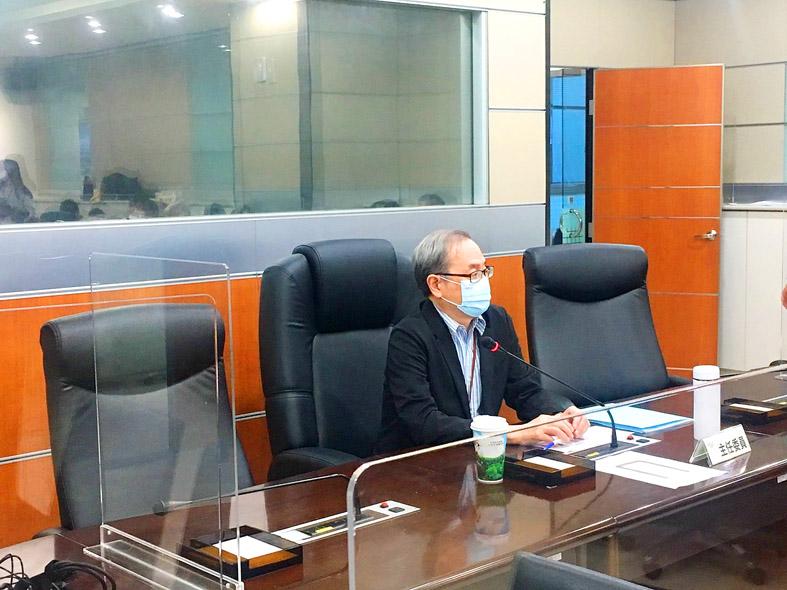The Atomic Energy Council (AEC) is planning to spend more than NT$500 million (US$17.77 million) on early warning, monitoring and research activities focused on the waters around Taiwan, the council said yesterday.
The statement came after Japan on Tuesday last week announced that it plans to release processed wastewater from the wrecked Fukushima Dai-ichi nuclear power plant into the ocean in several years.
However, the council said that it had made preparations for such a move ahead of Tokyo’s announcement.

Photo: Yang Mian-chieh, Taipei Times
Four years ago, its Radiation Monitoring Center was tasked with monitoring the waters, while a three-pronged strategy would be adopted in the future, the council said.
These would include cooperation with the Ocean Affairs Council to establish an early warning system and the development of monitoring technology to more precisely assess ocean currents, the council said, adding that the measures would cost about NT$128 million and be in place in about one-and-a-half years.
Once that infrastructure is set up, the council would in a four-year program monitor the situation and conduct research, and publish a comprehensive environmental impact assessment, the council said.
These measures would cost NT$400 million to NT$500 million, it said.
The council would also increase the number of offshore radioactivity detectors, it said.
Thirty-three detectors are in operation, and another 62 are to be created by the Fisheries Research Institute before the end of this year, it said.
The council would also seek cooperation with International Atomic Energy Agency (IAEA) investigators, it said.
As China is a member of the international body, it would be difficult for Taiwan to join, AEC Minister Hsieh Shou-shing (謝曉星) said.
The council would try its best to participate in the investigation team and monitor nearby waters, he added.
In case the IAEA rejects Taiwan’s bid, he hopes that the agency would share data from its monitoring operations with the nation, Hsieh said.
Wastewater from the Fukushima Dai-ichi plant is to be diluted to 1,500 becquerels of tritium per liter before it is discharged, Hsieh said, adding that it is within the limits set by the IAEA.
The human body would be able to process that amount within one month, he said.
However, a continuous risk assessment is needed, Hsieh said, reiterating that he opposes Japan’s plan.
People who are concerned that fish might contain radionuclides should not consume it, Hsieh said.
In related news, a simulation developed by a team led by Ho Chung-ru (何宗儒), a professor in National Taiwan Ocean University’s Department of Marine Environmental Information, showed that daily discharges of wastewater at the plant would have a 1 percent chance of affecting the waters near Taiwan, while it would take just one and a half years, at the earliest, for it to possibly affect Taiwan’s offshore waters.
The actual spread of the wastewater — including the range and speed — would depend on factors including the location of its release and the climate, the university said.

Alain Robert, known as the "French Spider-Man," praised Alex Honnold as exceptionally well-prepared after the US climber completed a free solo ascent of Taipei 101 yesterday. Robert said Honnold's ascent of the 508m-tall skyscraper in just more than one-and-a-half hours without using safety ropes or equipment was a remarkable achievement. "This is my life," he said in an interview conducted in French, adding that he liked the feeling of being "on the edge of danger." The 63-year-old Frenchman climbed Taipei 101 using ropes in December 2004, taking about four hours to reach the top. On a one-to-10 scale of difficulty, Robert said Taipei 101

Nipah virus infection is to be officially listed as a category 5 notifiable infectious disease in Taiwan in March, while clinical treatment guidelines are being formulated, the Centers for Disease Control (CDC) said yesterday. With Nipah infections being reported in other countries and considering its relatively high fatality rate, the centers on Jan. 16 announced that it would be listed as a notifiable infectious disease to bolster the nation’s systematic early warning system and increase public awareness, the CDC said. Bangladesh reported four fatal cases last year in separate districts, with three linked to raw date palm sap consumption, CDC Epidemic Intelligence

Two Taiwanese prosecutors were questioned by Chinese security personnel at their hotel during a trip to China’s Henan Province this month, the Mainland Affairs Council (MAC) said yesterday. The officers had personal information on the prosecutors, including “when they were assigned to their posts, their work locations and job titles,” MAC Deputy Minister and spokesman Liang Wen-chieh (梁文傑) said. On top of asking about their agencies and positions, the officers also questioned the prosecutors about the Cross-Strait Joint Crime-Fighting and Judicial Mutual Assistance Agreement, a pact that serves as the framework for Taiwan-China cooperation on combating crime and providing judicial assistance, Liang

US climber Alex Honnold left Taiwan this morning a day after completing a free-solo ascent of Taipei 101, a feat that drew cheers from onlookers and gained widespread international attention. Honnold yesterday scaled the 101-story skyscraper without a rope or safety harness. The climb — the highest urban free-solo ascent ever attempted — took just more than 90 minutes and was streamed live on Netflix. It was covered by major international news outlets including CNN, the New York Times, the Guardian and the Wall Street Journal. As Honnold prepared to leave Taiwan today, he attracted a crowd when he and his wife, Sanni,